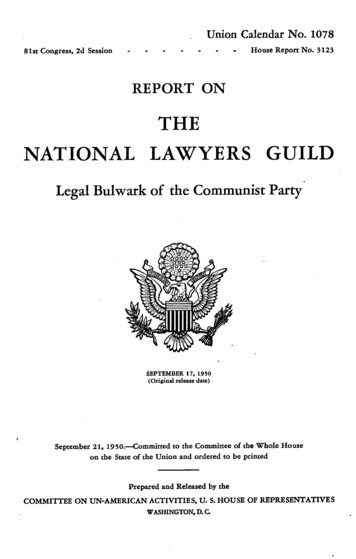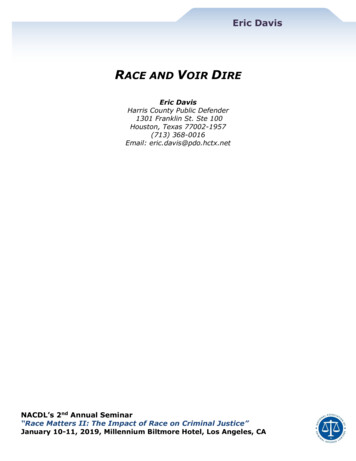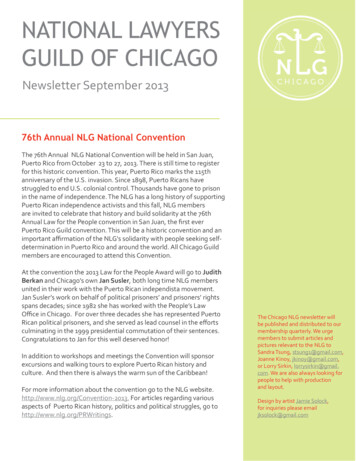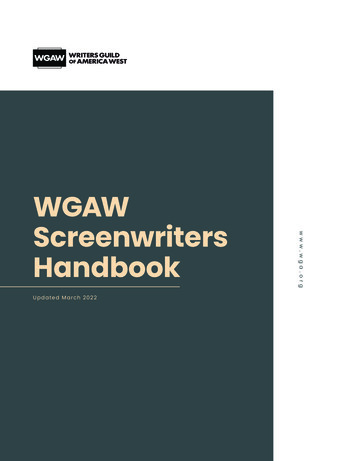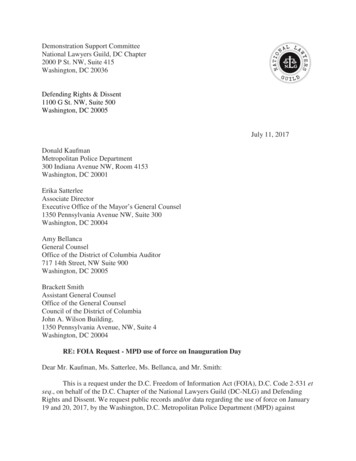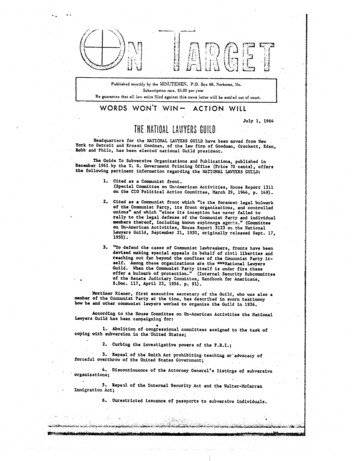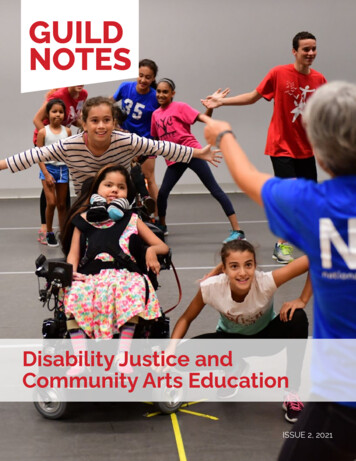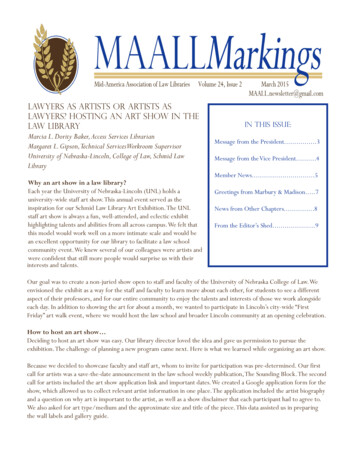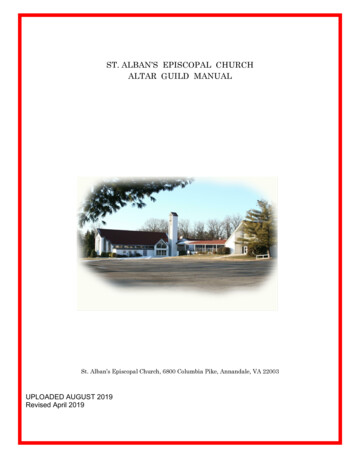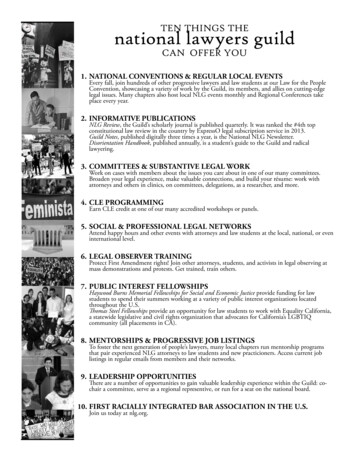
Transcription
TEN THINGS THEnational lawyers guildCAN OFFER YOU1. National Conventions & Regular Local EventsEvery fall, join hundreds of other progressive lawyers and law students at our Law for the PeopleConvention, showcasing a variety of work by the Guild, its members, and allies on cutting-edgelegal issues. Many chapters also host local NLG events monthly and Regional Conferences takeplace every year.2. INFORMATIVE PUBLICATIONSNLG Review, the Guild’s scholarly journal is published quarterly. It was ranked the #4th topconstitutional law review in the country by ExpressO legal subscription service in 2013.Guild Notes, published digitally three times a year, is the National NLG Newsletter.Disorientation Handbook, published annually, is a student’s guide to the Guild and radicallawyering.3. committees & Substantive Legal WorkWork on cases with members about the issues you care about in one of our many committees.Broaden your legal experience, make valuable connections, and build your résume: work withattorneys and others in clinics, on committees, delegations, as a researcher, and more.4. CLE programmingEarn CLE credit at one of our many accredited workshops or panels.5. Social & Professional Legal NetworksAttend happy hours and other events with attorneys and law students at the local, national, or eveninternational level.6. Legal Observer TrainingProtect First Amendment rights! Join other attorneys, students, and activists in legal observing atmass demonstrations and protests. Get trained, train others.7. public interest FellowshipsHaywood Burns Memorial Fellowships for Social and Economic Justice provide funding for lawstudents to spend their summers working at a variety of public interest organizations locatedthroughout the U.S.Thomas Steel Fellowships provide an opportunity for law students to work with Equality California,a statewide legislative and civil rights organization that advocates for California’s LGBTIQcommunity (all placements in CA).8. Mentorships & Progressive job listingsTo foster the next generation of people’s lawyers, many local chapters run mentorship programsthat pair experienced NLG attorneys to law students and new practicioners. Access current joblistings in regular emails from members and their networks.9. LEADERSHIP OPPORTUNITIESThere are a number of opportunities to gain valuable leadership experience within the Guild: cochair a committee, serve as a regional representive, or run for a seat on the national board.10. first racially integrated Bar Association in the U.S.Join us today at nlg.org.
WHAT DOES THE NATIONAL LAWYERS GUILD DO?A Fact Sheet for Prospective MembersThe NLG is a decentralized organization.Almost all of the programmatic work of the NLG is done by local chapters and committees,national committees, and individual members. Three affiliated national projects are the NationalImmigration Project, the National Police Accountability Project and the Sugar Law Center. Thisfact sheet does not cover the activities of the projects, but each has a separate web site, accessiblethrough nlg.org where information is posted about its activities. The crucially important work ofcoordination of our activities, communications, organizing, member services, publications,fundraising and many other tasks is performed by our National Office in New York.One of the Guild’s principal functions is providing a network for sharing information among itsmembers regarding their legal and political work. The many NLG email lists, websites andpublications that exist allow our members across the country to remain on top of the latestdevelopments and strategies that affect the cutting edge legal work they are doing.NLG members represent activists and others on a wide range of social justice issues. Asampling of lawsuits demonstrates the wide-ranging activities of NLG lawyers: Jim Fennerty (representing Chicago Palestinian community organizer Rasmea YousefOdeh, for allegedly not providing information on her citizenship application about aconviction in an Israeli military court more than 40 years ago) Brian McGivern and the Austin NLG (challenging Travis County Jail, and the privatesecurity firm Securus Technology, for illegally recording private conversations betweenattorneys and their jailed clients) Rachel Lederman and a team of Guild lawyers (securing 4.5 million from the City ofOakland for Iraq veteran Scott Olsen, who was nearly killed and now suffers permanentbrain damage after police hit him with a "non-lethal" projectile during a 2011 Occupydemonstration) Tom Nelson (challenging the government’s secretive no-fly list in his representation ofYonas Fikre who says he was tortured overseas at the direction of the FBI and blockedfrom returning home to the US. Fikre had refused requests from Portland-based FBIagents in Sudan to act as an informant at the Portland mosque he attended) NLG Massachusetts Chapter (securing a policy change by the Essex County Sheriffrequiring inmates to pay medical fees for health services in prison, and reimbursingprisoners for payments already made) Matthew Strugar, Matthew Liebman and others (filing suit against the anti-whistleblower“Ag Gag” law in Idaho) Larry Hildes and Karen Weill (challenging US Army and Fusion Center spying on anddisruption of Washington State peace activists)
New York City Guild attorneys (obtaining an 18 million settlement for protesters falselyarrested during the 2004 Republican National Convention–the largest settlement for massarrests ever.)The Guild’s Amicus Committee files and signs on to “friend of the court” briefs on a number ofissues, available at nlg.org. In 2014, the Guild, along with the Center for CompetitiveDemocracy and Ralph Nader, filed an amicus brief in Hedges et al., v. Obama et al., aconstitutional challenge to the National Defense Authorization Act (NDAA). We claim that theNDAA raises the chilling prospect that American citizens may be subject to indefinite militarydetention if they engage in speech or associational activity deemed to provide substantial supportto groups engaged in hostilities against the United States.In 2013, the Guild and the ACLU filed an amicus brief in support of the appeal in Blum v.Holder, a federal lawsuit filed in December 2011 by two Guild members, the Center forConstitutional Rights, and a professor at Cardozo Law School challenging the Animal EnterpriseTerrorism Act (AETA) as an unconstitutional infringement on free speech. Five animal rightsactivist plaintiffs claim their work has been chilled from fear of prosecution as terrorists underAETA.The Guild filed an amicus brief in Shelby County v. Holder asserting that treaty obligations andinternational law necessitated the continued application of the entire Voting Rights Act.The NLG protects our civil liberties.The NLG works to preserve civil liberties in the face of government initiatives in the “war onterror” that violate basic constitutional rights. As a member of the National Security SurveillanceCoalition—a group of privacy, civil liberties and human rights organizations—we supportprivacy and civil liberties protections in surveillance laws. National Mass Defense CoordinatorAbi Hassen and Executive Director Heidi Boghosian speak frequently on mass surveillance, datacollection and the history of terrorism law and its effect on political protest. Abi spoke at CUNYLaw School's Community Legal Resource Network’s CLE program on April 17, “Privacy andYour Practice: How to Keep Your Information Safe and Secure.” He also organized a standingroom only panel, broadcast on CSPAN, at the 2013 Left Forum on Information Activism.In conjunction with the Center for Constitutional Rights and other voices of freedom, welaunched the Palestine Solidarity Legal Support initiative so that students and other communityactivists can contact attorneys to request legal services, seek advocacy support, or reportincidents of repression related to their Palestine solidarity activism or other Muslim and Arabstudent activism.In early 2014, the Guild submitted congressional testimony to the Senate JudiciarySubcommittee on Constitutional, Civil and Human Rights hearing on solitary confinement. Inaddition to calling for an end to the torturous practice, we called for a full-scale reevaluation ofthe discriminatory U.S. criminal legal system as a whole, offering alternatives and reforms toaddress the epidemic of mass incarceration. A month later, we submitted comments to theBureau of Prisons calling for the closures of Communications Management Units.
In March 2014, we mobilized nearly 20 legal organizations to write Congress to emphasize theimportance of safeguarding lawyers’ obligation to represent clients absent fear of reprisal. TheFraternal Order of Police orchestrated a smear campaign against Debo Adegbile for the CivilRights leadership position at the Department of Justice using his position as Acting President andDirector Counsel of the NAACP LDF, which represents Mumia Abu-Jamal, to vilify him.The NLG organizes and sponsors significant international delegations.A delegation from the National Lawyers Guild met with Ambassador Lisa Kubiske in Hondurasin November 2013, and voiced its concerns for the safety of human rights defenders, and inparticular members of the Libre party. After the murders of attorneys José Nicolás Bernárdez andJudge Lenin Castañeda in March, we wrote to Ambassador Kubiske urging the embassy toconduct investigations into targeted killings, given that practicing law is a high-risk profession inthat country and that only nine cases, out of 67 killings of lawyers from 2010 to 2013, have goneto trial.Two delegations to Venezuela, with NLG election monitors, witnessed the election of Chavez’ssuccessor, President Maduro, and the audit of those results. NLG observers found the elections tobe free and fair. We called on Secretary of State John Kerry to recognize Maduro as thelegitimate President of Venezuela.This year, the National Lawyers Guild sent a five-member election delegation to El Salvador towitness the fruits of the FMLN efforts at reform, and observe the national elections. Delegatesvisited a number of government agencies and facilities, and met with the nation’s progressive barand activists. Judy Somberg and William Leavitt also met with the U.S. Ambassador to ElSalvador Mari Carmen Aponte, to lobby for a statement of neutrality in the election. Followingthe election, the delegation issued a press statement declaring a free and fair process thatincluded the implementation of a residential voting system and additional checks and balances;and a high degree of transparency, fairness and efficiency.The NLG issues regular publications on issues of legal and political significance.The NLG Review, the Guild’s scholarly journal, is read by lawyers, scholars, legal workers,jailhouse lawyers and activists, and includes articles that address and respond to the interests andneeds of the progressive and activist communities. Named by EspressO Legal SubscriptionService as a top ten law review, in 2013 it was ranked #4 in the Constitutional Law category.Members, law libraries and other subscribing institutions receive the NLG Review each quarter.Guild Notes is the organization’s quarterly e-newsmagazine of members’ work and NLGadvocacy, litigation and activist initiatives. Members and subscribing institutions receive GuildNotes three times a year.The National Office issues reports on a range of topics. Our most recent report, Breach ofConfidence: Spying on Lawyers in the United States (2014), brings to light the government’slong history of covert surveillance of attorneys and their activist clients. Other reports include:
High Crimes: Strategies to Further Marijuana Legalization Initiatives (2013) and Developmentsin the Policing of National Special Security Events: An Analysis of the 2012 RNC and DNC(2013).The NLG protects the rights of military service members.The NLG Military Law Task Force (MLTF) defends the rights of GIs, and most especially, thosewho are resisting the military’s imperial mission, at home and abroad, providing crucial legalresources to members of the military and their families and friends.In 2014 the MLTF is issuing “Military Sexual Violence: A Guide to Sexual Assault and SexualHarassment Policies in the U.S. Armed Forces.”The MLTF website, housed on the NLG’s website (nlgmltf.org) receives over 12,000 hits permonth. As one Marine, facing his fourth deployment to Iraq, stated, “It’s my favorite website inthe world.” Its law digests and memos include “The Legality of Counter-Recruitment Work,”and others on conscientious objection, command influence, military contractors, discharges andhabeas petitions. As a founding member of the GI Rights Hotline, the MLTF assists in handlingthe over 3,000 calls per month coming into the Hotline and directly to its member organizations.It provides training for lawyers and counselors representing service members actively involvedin GI Resistance, seeking discharges, as well as those wanting to challenge sexual harassmentand assault. The MLTF is at the forefront of challenging extensions of tours and length of duty.The NLG represents the interests of working men and women.In addition to the work done by Sugar Law Center, many NLG members represent the interestsof workers and labor unions through our Labor & Employment Project. A large number of NLGlawyers are employed as counsel to labor unions. For example, the Los Angeles Chapter of theLawyers Guild has established a special expertise in working with local labor unions and localworkers’ movements. The Chapter trains union picketers in tactics of legal and militantpicketing; serves on the advisory boards for union and union/community organizing efforts; aidsworkers in negotiating their grievances with employers; and represents workers arrested in thecourse of labor disputes. The chapter has been honored by several unions for its work in thisregard.The NLG engages in trainings and public education about legal rights.Several local Guild chapters engage in a variety of programs to educate members of the publicabout their legal rights. Student chapters at a number of law schools are involved in “street lawclinics” that conduct public workshops on immigrant rights, landlord tenant law, constitutionalrights with respect to search and seizure and other topics. The National Office publishes a seriesof Know Your Rights booklets in English, Arabic, Spanish and Urdu and operates a hotline forindividuals contacted by the FBI. And the National Office conducted a two-part training for over70 attorneys on representing Keystone XL pipeline protesters.Jim Lafferty and the Los Angeles Chapter of the Lawyers Guild host a weekly public affairs
radio show on KPFA. The show is designed to educate the public on legal matters, on publicissues having a legal component, and on other issues of national and local importance. Itprovides community activists from Southern California, who are generally unable to receive airtime on commercial stations, with an opportunity to share their views on the issues with thegeneral public. The show is one of main ways in which the progressive community in SouthernCalifornia learns about upcoming public meetings, government hearings, and progressivepolitical movements for social change.NLG Executive Director Heidi Boghosian, past NLG president Michael Ratner and NYCmember Michael Smith host a weekly civil liberties program, “Law and Disorder,” on WBAIradio in New York. The program is also carried on over 60 other stations nationally, and coversissues of domestic and international legal concern, with guests who are actively involved inchallenging human rights violations firsthand. On the show’s website, lawanddisorder.org, eachprogram is available for download or on podcast.NLG law students are engaged in important political and legal projects that carry out thework of the Guild.The NLG has over 100 student chapters that operate autonomously at their law schools and aresupported by local attorneys and legal workers, the National Office, and staffed chapters. Thereare representatives from most chapters on a national student listserv run out of the NationalOffice, which serves to share resources and ideas among all the chapters. Some examples ofcurrent Guild student chapter work are:In the Secure Communities Project, NLG law students have synthesized the legal and activistinterventions that have been attempted thus far and are developing a workshop curriculum andother training materials. An Expungement Project with Community Legal Services is run byTemple NLG students. Immigration Court Observations are ongoing at law schools in NewYork City and Los Angeles. A Notario Project at Villanova Law School identifies unscrupulousindividuals purporting to be immigration attorneys, as well as lawyers acting unethically in theperformance of their duties representing immigrants. And this March, approximately 35 NLGstudent chapters organized events at their law schools to honor the Guild’s “Student WeekAgainst the Death Penalty."Students continue to act as Legal Observers at local protests and mass assemblies and to organizepetitions on issues of controversy, such as Suffolk University’s selection of Abe Foxman ascommencement speaker and UC Hasting’s selection of Janet Napolitano.The NLG conducts internal education and other activities to become a more diverseorganization and to strengthen the anti-oppressive work of the Guild.At the 2004 NLG Convention in Birmingham, the United People of Color Caucus (TUPOCC)—an alliance of legal workers, law students, lawyers, and jailhouse lawyers of color within theNLG—formed out of a recognition that meaningful racial, social, and economic justice can onlybe achieved when people of color and all other beleaguered communities are more than mereafterthoughts. Since then, Guild leadership and TUPOCC have worked to change the
predominantly white culture of the Guild, to promote an anti-racist culture and to strengthen theGuild's anti-racist work. In furtherance of this effort, various chapters, committees, and regionshave signed onto the “TUPOCC pledge,” committing to undertake anti-racist work, challengeracism internally, and increase efforts to meaningfully recruit and retain legal activists of color.The Guild institutionalized a scholarship for law students of color to attend Guild conventionsand substantially increased its budget for inviting speakers representing communities of colorand other constituencies to speak at Guild conventions. The Guild has conducts anti-oppressiontrainings for Guild members at national and local meetings, and TUPOCC has facilitates ameeting and political education space at the Guild's national conventions. A number of TUPOCCmembers have been elected to leadership positions within the Guild.JOIN THE NLGMembership in the National Lawyers Guild is open to attorneys, law students, jailhouse lawyers,and legal workers. Legal workers are defined as anyone who has worked in any office, collectiveor other institution which has as its primary function the provision of administration of legalservices, information or education.Each membership payment entitles members to four issues of NLG Review and three issues ofGuild Notes, delivered either digitally or in the mail, as well as the right to vote in any NLGnational election taking place during the period of membership, which lasts one year.Members of bar associations of color need only pay half of the suggested rate for theirincome. This rate does not apply to committee dues.We also offer firm and family memberships. If you join or renew as a firm or family you needonly pay 75% of the total cost of membership dues for all members to join as individuals. Thus,if you have two lawyers in a family or firm who would normally pay 300 each, you only needpay 450 together. This also doesn't apply to committee dues.Questions about membership? Contact membership@nlg.org.
national lawyers guild132 Nassau St., Rm. 922New York, NY 10038212-679-5100 (phone)212-679-2811 (fax)www.nlg.orgMembership FormMEMBER lease provide email even if requesting paper publications.)Member type: Attorney Jailhouse Lawyer Law StudentLaw School/Year of Graduation:*Description of practice and fields of concentration:* I would like to receive legal referrals. YES / NO Legal WorkerI want to join the NLG email listserv. YES / NOThe default method for distributing Guild publications is digital. Check the box below if you wish to receive papercopies instead. Yes, I want to receive my Guild publications in paper form.PAYMENT INFORMATIONCOSTMembership Dues (see back for recommended amounts based on financial ability)* One Year Listing in the Online Referral Directory ( 50 fee, 35 for recent law school graduates)Donation to send the Jailhouse Lawyer’s Handbook to Prisoners ( 2 fee)Donation to the Student of Color Travel Stipend, for the NLG Convention Donation to the Haywood Burns Memorial Fellowships Program for Social and Economic Justice Donation to the NLGCommittee Dues: See back. Please check the committees you wish to join and add their cost here.Make Checks Payable to National Lawyers Guild. To pay by Visa or MasterCard fill out the section below.TOTAL:Visa/MasterCard (circle one) Card #: Exp. Date:Amount: Signature:* If you choose to be listed in our online Referral Directory, please provide your work address, fields of concentrationand, if you’d like, a brief description of your practice. If you are a legal worker, this will be noted in the directory. Donations to the NLG or to the Haywood Burns Memorial Fellowships Program for Social and Economic Justicewhich are made payable to the National Lawyers Guild Foundation are tax deductible to the full extend allowed by law.
NLG Dues ScheduleDues are suggested. We are honored to accept whatever you can afford. If you cannot pay your dues, pleasecontact the National Office to maintain your membership free of cost. If you did not pay dues in previous years,you do not need to pay back-dues, only dues for the current year.Suggested Dues 600 or more 500-600 375-425 325-375 275-325 220-275 165-220 100-165 75-100 60 20-50No Dues ( 7.50 to receive “Guild Notes”)Income/Category 200,000 100-200,000 75-100,000 65-75,000 50-65,000 40-50,000 30-40,000 25-30,000 20-25,000New Member Atty/Legal WorkerLaw Student/First Year LawyerJailhouse LawyerWe also offer firm and family memberships. If you join or renew as a firm or family you need only pay 75% ofthe total cost of membership dues for all members to join as individuals. Thus, if you have two lawyers in afamily who would normally pay 200 each, you only need pay 300. Members of minority bar associations needonly pay half of the suggested rate for their income. This rate does not apply to committee dues.Committees of the NLG Amicus Committee Animal Rights Activism Committee Anti-Racism Committee ( 12) Anti-Sexism Committee ( 0- 15) Center for Democratic Communications ( 25) Disability Rights Committee ( 15) Drug Policy Project Environmental Justice Committee Housing Committee International Committee ( 25) Africa Subcommittee Cuba Subcommittee ( 15) Environmental Human Rights Subcommittee Free Palestine Subcommittee Haiti Subcommittee Korean Peace Project International Labor Justice Working Group Indigenous Rights SubcommitteeInternational Committee (continued) Iran Subcommittee Philippines Subcommittee Puerto Rico Subcommittee Task Force on the Americas UN Subcommittee Labor/Employment Committee ( 35; 15 forstudents) Legal Workers Committee Mass Defense Committee Mass Incarceration Committee Military Law Task Force ( 25, includesnewsletter) Next Generation Committee (Recent Graduates) Prison Law Project ( 10-40; free for JailhouseLawyers) Queer Caucus The United People of Color Caucus (TUPOCC –Open to all members who self-identify aspeople of color; sliding scale fee 15- 30.)
New York City Guild attorneys (obtaining an 18 million settlement for protesters falsely arrested during the 2004 Republican National Convention-the largest settlement for mass arrests ever.) The Guild's Amicus Committee files and signs on to "friend of the court" briefs on a number of issues, available at nlg.org.
